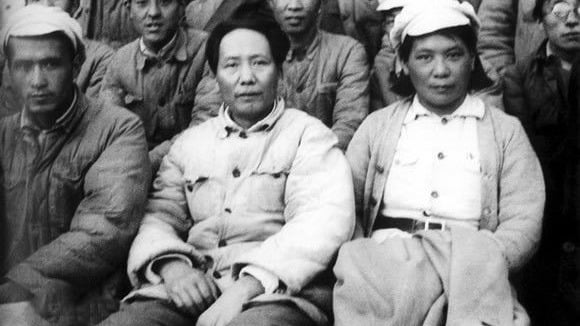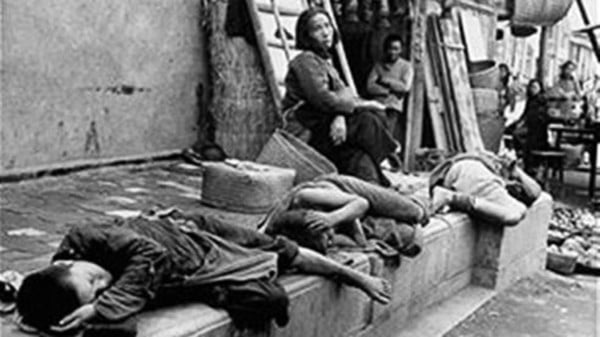
[ad_1]
Mao Zedong. (Photo credit: Keystone/Getty Images)
Mao ZedongBefore dying, start paying attention to yourselfBirthdayaccording to an article signed by Sun Guolin, Mao Zedong suddenly appeared on his last birthdayomen of death:longevity noodlesThey were all broken into pieces in the pot, not a single piece was whole.
According to the article “Anecdotes about Mao Zedong’s Birthday” signed by Sun Guolin, Mao Zedong sometimes invited some people to get together on his birthday, December 26. Just put a few simple dishes and some red and white wine on the table and chat with others.
December 26, 1975, Mao Zedong’s 82nd birthday, was also his last birthday. On this day, Mao Zedong specially invited several people who had worked around him before. Early in the morning, Mao’s daughters Li Min and Li Ne, head nurse Wu Xujun, secretary Zhang Yufeng and others came to Mao Zedong’s room one after another.
The longevity noodles for Mao Zedong’s birthday this time were made by Tian Shubin, a pastry chef from Zhongnanhai. Tian Shubin’s pasta snacks are particularly good. Every time Mao Zedong’s birthday was served, he would make the longevity noodles. But this time when Tian Shubin put the noodles into the boiling pot, something unexpected happened: the noodles were all broken, one by one, and no one was intact! Tian Shubin and others were stunned. Tian Shubin cried and said, “This is incredible!” There has never been anything like this, I have never made noodles like this in my life.
Finally, Wu Liandeng, the chef in Mao Zedong’s kitchen, decided: cook noodles! Decades later, Wu Liandeng said, “Mao Zedong didn’t know about this until his death. How did he know that the last bowl of longevity noodles was not hand-rolled noodles, but dried noodles.”

Mao Zedong and Ding Ling took a photo in Yan’an. (Picture source: Internet picture)
A mysterious number given by a Taoist priest
Mao Zedong, who was at the pinnacle of power in China at that time, vigorously promoted the prohibition of feudal superstition, but he himself was a complete superstitious person.
It is said that in 1949, before Mao planned to go to Beijing, he made a special trip to Longhu Pass in Xishan Mountain and found a Taoist priest to tell his fortune. We asked about the auspicious day of entering Beijing, future fortune, political stability, and even life span! The old Taoist priest was very happy and wrote down two mysterious numbers “9, 9” and “8341”.
So, at 9 o’clock on September 9, 1949, Mao stepped on the spot and entered Beijing. As for the number “8341”, Lao Mao has always regarded it as his talisman, and even changed the number of the “Forest Army” guarding him – the Central Guard Division to 8341. It was not until Mao’s death in 1976 that people were surprised to discover that the original set of numbers said that Mao would die on September 9 and lived to be 83 years old. And 41 means that starting from the Zunyi Conference, Mao seized power from Wang Ming and stayed in power for a total of 41 years. The strange thing is that Mao’s death and the day he took over Zhongnanhai were actually the same day.
The Forbidden City dare not return to Yan’an
Everyone knows that Mao Zedong holds great power and controls the life and death of the Chinese people. But why has he never dared to go to the Forbidden City in the Forbidden City all his life?
It is said that after Mao met the Taoist master of Longhu Pass, he also met another old Taoist. The old Taoist once told Mao, “The emperor’s residence is not allowed to be entered. If you marry a wife, you will have three houses in your life.”
After what the Taoist priest said, Mao chose Zhongnanhai, next to the Forbidden City, as his place to live. Zhongnanhai was the prison where Cixi held Guangxu under house arrest. He couldn’t live in the imperial palace so close to him, but had to live in such an unlucky place where the emperor was imprisoned. It seems that Mao believed deeply in the words of the old Taoist, for fear that the royal aura of the Forbidden City would suppress him. He considered himself lawless and would not dare to step outside the realm of justice throughout his life.
In addition to the Forbidden City and the Forbidden City, another place that Mao was very afraid of was Yan’an. It is said that Yan’an is Mao’s place of prosperity and the home that helped him seize power. After entering Beijing and becoming the leader of the country, he did not even dare to go back to Yan’an to take a look. It turned out that it was under the guidance of an expert

During the Chinese Communist Party’s Great Leap Forward, many people starved to death on the streets. (Internet picture)
The 7 worst sins of mankind
During his 27 years in power, Mao Zedong promoted his ultra-left line based on class struggle. Under such circumstances, China has experienced some tragic, absurd, hateful, terrifying, and cruel human disasters, each of which can be regarded as the worst for mankind.
As early as December 2014, an article signed by Zhuang Guisan circulated on the Internet, summarizing Mao Zedong’s seven worst sins among mankind. They were the Anti-Rightist Movement in 1957, the Great Leap Forward in 1958, and about 60 million people died of starvation in China from the winter of 1958 to the spring of 1962.
Zhou Yahui, a former graduate student in the Department of Economics at Renmin University of China in Beijing, used modern methods to compare Chiang Kai-shek and Mao Zedong. He said that Mao Zedong caused at least 100 million abnormal deaths of Chinese people during his communist ruffian revolution and after taking power, while Chiang Kai-shek There is no similar record. Mao Zedong was narrow-minded and tortured Liu Shaoqi and a large number of cadres to death. Chiang Kai-shek was magnanimous and meritocratic. Mao Zedong led the communist bandits to kill people and steal goods, seize people’s property and engage in promiscuity, while Chiang Kai-shek protected private property rights.
Zhou Yahui also said that the Chinese people mistakenly accepted the Communist Party’s confusion and poison. The fault lies not with Chiang Kai-shek, but with the Communist Party and the Chinese people themselves.
Editor in charge: Yi Tian
Short URL:
All rights reserved. Reprinting in any form requires permission from this site. It is strictly prohibited to create mirror websites.
[Honorary Members Wanted]Streams can merge into the sea, and small kindnesses can achieve great love. We sincerely recruit 10,000 honorary members from Chinese people all over the world: each honorary member only needs to pay a subscription fee per year and become an honorary member of the “Look at China” website, which can help us break through censorship and blockade and provide services to at least 10,000 mainland Chinese compatriots. Provide independent and true key information to warn them in times of crisis and save them from pandemics and other social crises.



